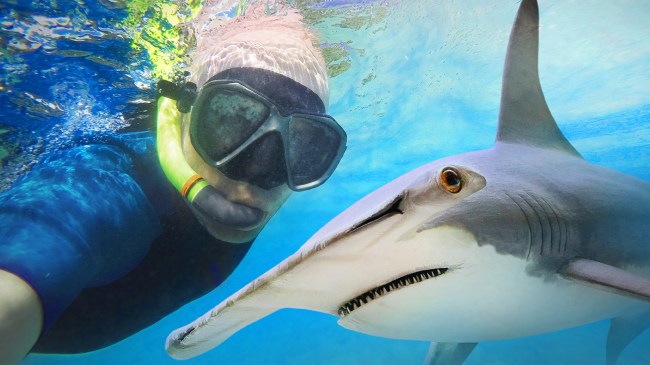iStockphoto
Jaws has managed to traumatize multiple generations of people who are wary about wading into the ocean due to the possibility they might encounter a shark. However, there are plenty of others who won’t think twice about interacting with the animals despite the well-documented downsides, and a new study asserts influencers deserve some blame for the gruesome repercussions of some ill-fated interactions.
Most people are aware shark attacks are a relatively rare occurrence in the grand scheme of things. According to data compiled by the ISAF, there were 47 unprovoked incidents around the world in 2024 that led to four fatalities, and in that year, 12 people were killed after being struck by lightning in the United States alone.
Jaws may have revolved around a bloodthirsty shark that seemingly took pleasure in hunting down humans, but it was also a horror movie with little basis in reality. In the vast majority of cases, sharks aren’t going out of their way to interact with—never mind attack—people, and a very sizeable chunk of documented incidents involve surfers and divers bearing a resemblance to prey like seals and sea lions who fell victim to a case of mistaken identity.
With that said, sharks are just one of the many types of wild animals that instinctively take exception to the violation of their personal space, and you’re just asking for trouble if you go out of your way to attempt to interact with them.
The aforementioned ISAF statistics determined 2024 also spawned 24 shark attacks that were officially classified as “provoked,” and some new research that was recently published in the scientific journal Frontiers in Conservation has laid some of the blame on influencers who’ve helped normalize ill-advised encounters.
The paper only looked at shark attacks that occurred in French Polynesia between 2009 and 2023 but determined between 3% and 5% of them were the result of the predators having a defensive reaction to the invasion of their space.
Eric Clua, a professor at France’s PSL University who oversaw the research, elaborated on the findings with The Times while laying some of the blame on viral social media posts from people who’ve captured themselves getting up close and personal with sharks, saying:
“I don’t encourage, as many influencers do on social networks, to cling to a shark’s dorsal fin or stroke it, under the pretext of proving that they are harmless and supposedly working for their conservation.
In addition to reducing the number of such bites in the field, we hope that one of the major effects of our study will be to modify the vision and attitude of journalists by suggesting that they take a closer look at the conditions in which bites occur, without systematically blaming the animals, but rather making humans more responsible.”
I was surprisingly unable to find a graph documenting the year-by-year trend of provoked shark bites, but it does seem like there’s been a rise in that category as social media has exploded in popularity; there were 16 provoked attacks in 2013 and 14 in 2014, but there was an average of around 32 each year between 2018 and 2024.
I honestly did not think people needed to be reminded that annoying sharks isn’t a great idea, but I guess that’s not the case.
Content shared from brobible.com.

